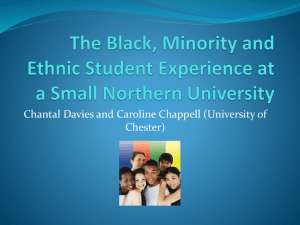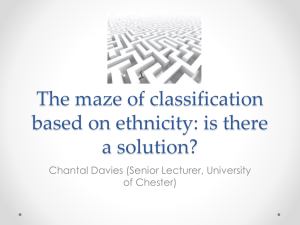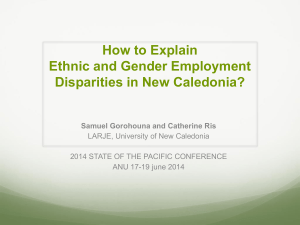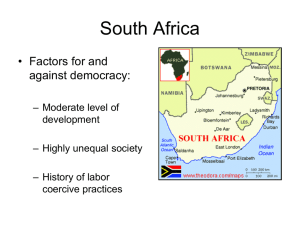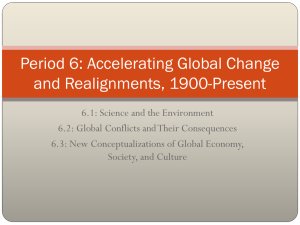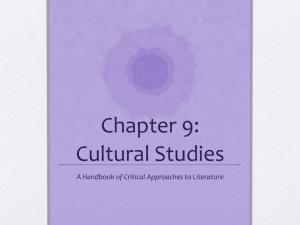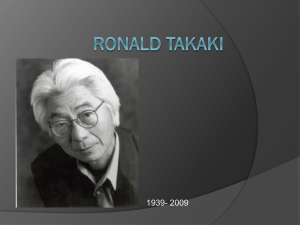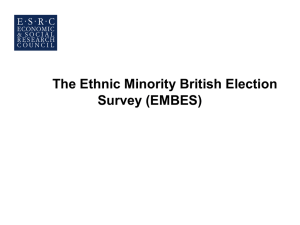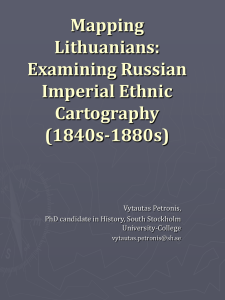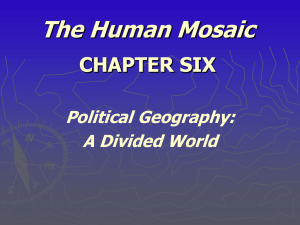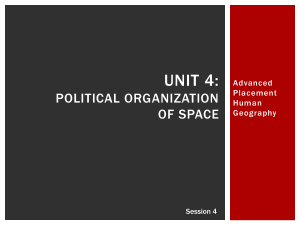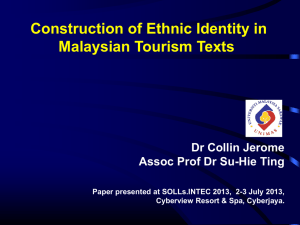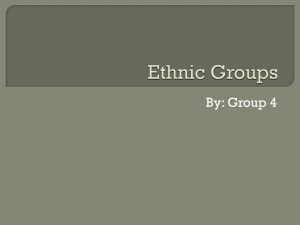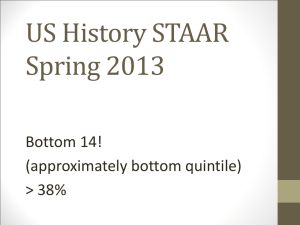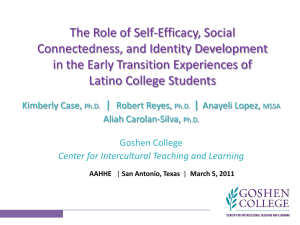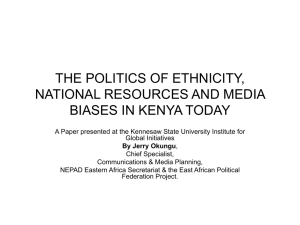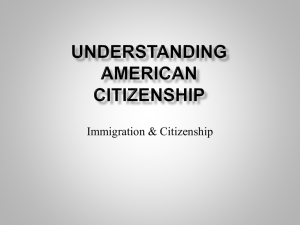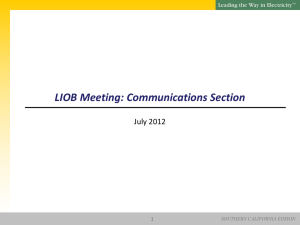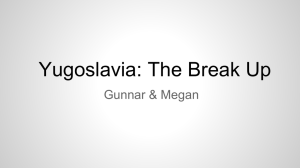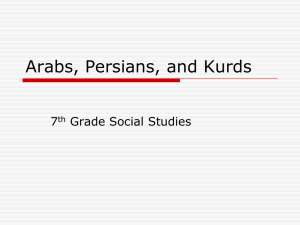Lecture 8
advertisement
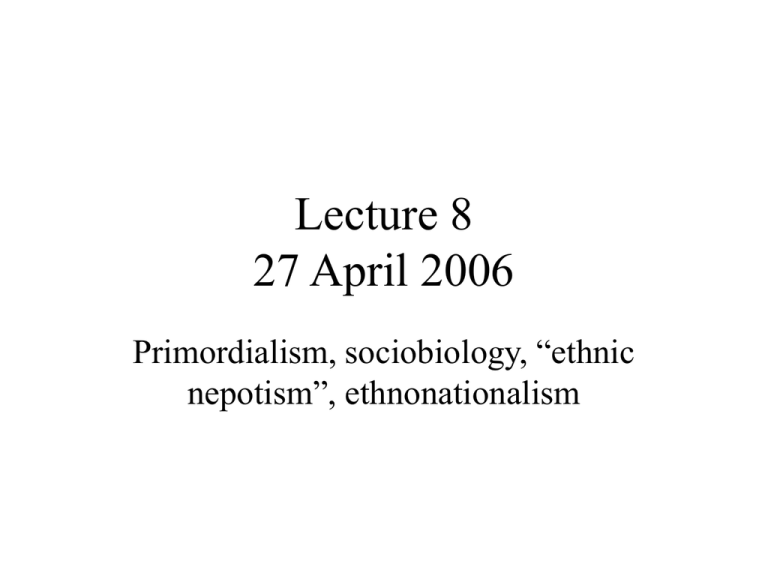
Lecture 8 27 April 2006 Primordialism, sociobiology, “ethnic nepotism”, ethnonationalism Nationalism and ethnicity • Debate about the origins and character of ‘the nation’ • Nation: ancient or modern? • Are nations real or constructed? • ‘Do nations have navels?’ Constructionist / anti-constructionist divide • Primordialist or perennialist / modernist, instrumentalist accounts • Each of these views is internally differentiated and encompasses a range of positions • Yet, there are fundamental differences in their theoretical understanding Primordialists • 18th century German romantic nationalists (e.g. Herder, Fichte, Humboldt) • nations, ethnic groups, races are one of the natural divisions of the human race (justified by God’s will) • differences stemming from old and deeply rooted ethnic, religious and/or linguistic distinctions • Recent: Edward Shils, Clifford Geertz, Steven Grosby, Pierre L. van den Berghe Primordialism (Fenton, 1999) • Shils, Geertz: distinction between ‘primordial’ (associated with birth and kinship) and ‘civil’ ties (associated with citizenship of a modern state) – how can ‘civil’ ties compete with persistence of ‘primordial’ attachments? • Late 1950s, early 1960s: the term primordialism enters the debate (= fundamental attachment grounded in early socialisation), it has persisted as a focal point of debate about the nature of ethnicity as a social bond and identity • Initially, primordialism was regarded as a specific problem of new states (Asia, Africa) but the writers were not defining ethnicity as a primordial type of attachment (cf. misdirected critique of Eller & Coughlan). Perennialists • Perennial = lasting a very long time or happening repeatedly or all the time • Because primordialism has a pejorative status, recent theories proposing an essentialist view are now termed perennial because they emphasise the durability of nations: • the roots of modern nations are generated by preexisting affiliations • nations seen as perennial (lasting a long time, constantly recurring) and immemorial Ethnicists • accept the modernity of nationalism as ideology and a political movement • ethnic communities and nations are related phenomena • analysing the origins and genealogy of nations (ethnic roots; ethnic “origins” of nations) • the need to study the process of nationformation within and through a longer and more cyclical account of history Modernists • approach which has become widely accepted over the last decades (“Everyone agrees that nations are historically formed constructs.” Roger Brubaker) • the nation seen as a purely modern phenomenon; no relation to ethnic group • nations and nationalisms were constructed and generated by particular new historical circumstances and social and economic conditions, which occurred about two hundred years ago Circumstantialists / instrumentalists • ethnic feelings arise out of specific social conditions; ethnic identity depends on circumstances, context, stressing its manipulability • The transactionalist and instrumentalist perspectives of anthropology emphasise the malleability of ethnic ties • Emphasis on the ways in which ethnic groups and ties are useful and effective for attainment of individual and collective goals (e.g. rational choice approach to ethnicity; game theory – prisoner’s dilemma) – studying the circumstances in which individuals decide whether to use their ethnic identity or align with others on basis of gender, class, religion (rather than kin) Are ethnies and nations ancient or modern? • the modernists (instrumentalists) see the nation as a purely modern phenomenon; it is a product of capitalism or industrialism and bureaucracy, an outcome of modernisation – nationalism comes before nations • in opposition, the primordialists see nations as ‘forever there’ entities that have existed for centuries, if not for ever – nations come before nationalism • somewhere in between stands the position of the ethnicists: neither type of approach “has much place for the vicissitudes of ethnic community and identity over the longue durée” (Hutchinson & Smith, 1996) The gap between ‘common sense’ and scholarship • most people seem to think of (their) ethnic group in ‘primordial’ terms • “... when analysing sociopolitical situations, what ultimately matters is not what is but what people believe is. And a subconscious belief in the group’s separate origin and evolution is an important ingredient of national psychology” (Walker Connor) Francisco J. Gil-White “How Thick is Blood? The Plot Thickens...: If Ethnic Actors are Primordialists, What Remains of the Circumstantialist/Primordialist Controversy?” Ethnic and Racial Studies, 1999, Vol. 22, No. 5 • “ethnic actors conceive membership in terms of categorical descent: biological descent from those possessing a label implying a given cultural ‘essence’ or ‘peoplehood’” • ethnic or national groups are not “objectively primordial”, but Gil-White makes an attempt to “distinguish between what an ethnic group is to its members psychologically, and the objective reasons why such groups may form” • “To insist that actors perceive co-ethnics as sharing biological descent is to describe the manner in which individuals cognize the ethnies they participate in.” • The fact that a nation or ethny is perceived by its members in terms of common origin, shared history or, indeed, shared descent, usually has very little to do with the actual situation of nation-formation Ancestry • “What is true of ancestry is true of ethnicity – both are simultaneously socially grounded and socially constructed.” (Fenton, 1999) • ‘hot’ ethnicity: blood, passion, ‘people like us’ (mobilising the presumed implicit collective identity) • ‘cold’ ethnicity: calculation, instrumentality • The language of ethnonationalism is the language of blood, family, brothers, sisters, mothers, forefathers, home... (Walker Connor) • Again, the appeal to family likeness is not the same as real shared ancestry; it does not necessarily accord with factual history. Sociobiology • = “the application of evolutionary biology to social behavior of animals, including Homo sapiens” (David Barash Sociobiology and Behavior. New York: Elsevier, 1982) • Sociobiologists study the behaviour of social animals, including humans • One of the greatest scientific controversies of the late 20th century, stretching into the 21st century as well; critics accuse sociobiologists of biological determinism Sociobiology • Edward O. Wilson’s 1975 book Sociobiology: The New Synthesis started the discussion • Animal, as well as human behaviour cannot be explained by cultural or environmental factors alone. Sociolobiologists argue that evolutionary origins must also be taken into account when attempting to understand behaviour. Ethnic nepotism • Theory of kin selection and inclusive fitness: incorporating not only one’s own reproductive success, but also the reproductive success of one’s relatives: the more genes we share with another individual, the more altruistic we feel toward them (developed by William D. Hamilton “The Genetical Theory of Social behavior: I and II.” Journal of Theoretical Biology, 7, 1964) • Ethnic groups and nations should be seen as forms of extended kin groups • Ethnocentrism is an extension of kin selection Ethnic nepotism • Pierre van den Berghe The Ethnic Phenomenon 1981: ethnic favouritism, racism, ethnocentrism is an extension of familism; but humans do not have a biological predisposition to be either ethnocentric or racist • “If you understand the politics of nationalism and ethnicity, you must realise that they are both socially constructed, but not at random. You can create a myth of common descent, but the myth will only be believed if it’s credible; it has to have some basis in reality.” (van den Berghe) • Ethnic nepotism is a human tendency to favour kin over nonkin, in-group favouritism applied on ethnic level; it means human tendency to favour ‘our people’ at the expense of others Next week’s readings: • • • • • • • • • From the “Ethnicity” Oxford reader (Hutchinson & Smith, 1996): Leo Kuper “Genocide and the Plural Society” Helen Fein “The Armenian Genocide and the Holocaust” Sammy Smooha & Theodor Hanf “Conflict-Regulation in Deeply Divided Societies” John McGarry & Brendan O’Leary “Eliminating and Managing Ethnic Differences” Magaš, Branka (1993): The Destruction of Yugoslavia: Tracking the Breakup 1980-92 Ramet, Sabrina Petra (1996): Balkan Babel: The Disintegration of Yugoslavia from the Death of Tito to Ethnic War Or any other relevant book on Yugoslavia or Rwanda etc. you can find Pdf files available on the web
